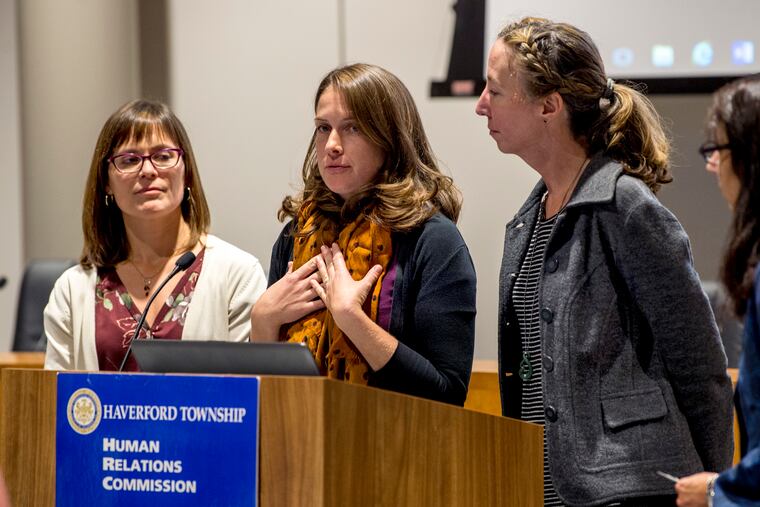Haverford leaders defend township and schools against racism complaints
The hearing debated issues raised by a report from the Havertown-Area Community Action Network alleging a worrisome pattern of racial bias and profiling.

Charges of racial incidents in Haverford Township and its schools – a topic that has roiled the Delaware County township since release of a controversial report on the subject in April – got strong pushback Wednesday night from the district superintendent and police chief at a crowded community forum.
Maureen Reusche, superintendent of the Haverford School District, told the gathering of roughly 100 people that "it saddens me" to hear any complaints of racial bias, but she argued that the report from the Haverford-Area Community Action Network dealing with issues such as racial harassment and a lack of nonwhite teachers had mischaracterized the problem.
Reusche said she was angry that "there seems to be broad, sweeping generalizations made of the district" in the H-CAN report in alleging discrimination and hate crimes within the Delaware County township. "I know that is not representative of the district as a whole."
The schools chief was followed at the forum – sponsored by the Human Relations Commission of Haverford – by Police Chief John Viola, who vehemently disputed the report's contention that drivers in the township, which has a 3.3 percent black population, are racially profiled. Viola showed a slew of data to back his contention that black drivers are not stopped disproportionately more than others.
Not everyone in the crowd — which was allowed to submit written questions to the panelists — agreed with the defensive responses by top officials.
"Nothing she said was satisfactory," Khalilah Carmichael, a black township resident who works in health-care information technology, said after Reusche spoke. Carmichael said she was particularly troubled by the superintendent's response that the district doesn't need to hire a chief diversity officer — one of the main recommendations in the H-CAN report — because that task has been taken on by another employee and that her priority would be to hire more mental-health and guidance staff.
"She told us that was more important than diversity — she doesn't seem to understand that these experiences matter," said Carmichael, referring to students who, according to the report, were sometimes called the N-word or treated badly by students or district staff.
The hearing was the first opportunity of the new school year for township residents to discuss and debate the issues raised by the H-CAN report.
Community activists said recently they've been frustrated with the lack of a conversation around the report and specifically with the response from the school district, which they said failed to respond to its calls for the chief diversity officer or for including parents or residents in district inclusion efforts.
Officials with the highly rated, 6,000-student Delaware County district have insisted before Wednesday's meeting they are making progress on diversity, citing the recent hiring of an African American principal and increased cultural sensitivity training for students and staff.
Schools in the township of roughly 48,000 – blending middle-class streets and islands of affluence – are 84.6 percent white but, like most classrooms in the Philadelphia suburbs, have grown slightly more diverse in recent years. According to state statistics, just a couple of years ago 98 percent of the teachers were white.
The April report – which sparked a call for action from the Main Line NAACP – highlighted a number of bias incidents and alleged hate crimes in the schools and community, such as an 11-year-old black child riding a bike and called the N-word by an adult in a passing car, a swastika scrawled on the trash can of a Jewish resident, and an immigrant family whose picture at a Havertown playground was posted on social media with accusations they might be kidnappers.
Reusche told the audience at the forum that school leaders are aware of the need to hire more nonwhite teachers and have made plans to attend a Philadelphia-area diversity job fair this year for the first time. But the superintendent said that the pool of available teachers overall is shrinking, making the market highly competitive.
"We don't ask race on applications and we don't use recruiters," Reusche added. "Anyone hired is on their own merit."
Larry Feinberg, the Haverford school board president, stood up at the meeting to say that recruitment of more nonwhite teachers was one of the district's top goals for the current school year.